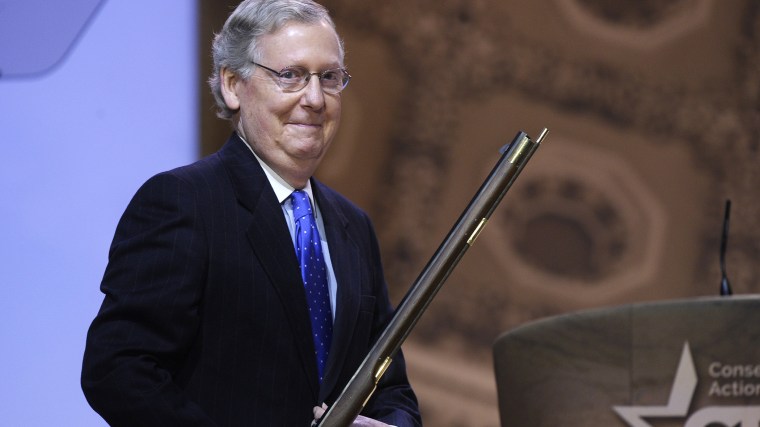Historically, incumbent congressional candidates have a strong advantage when running for re-election. They tend to have stronger name recognition, better fundraising, experience on the campaign trail, and ideally some kind of relationship with their constituents. It's why, on average, incumbents win about 90% of the time.
But there's a flip-side. Depending on the prevailing political winds, incumbents can sometimes be vulnerable to criticisms that resonate: they're "Washington insiders," who've "lost touch with the folks back home," which is why it's "time for a change."
With this in mind, Senate Minority Leader Mitch McConnell (R) is trying out a curious pitch in Kentucky, where he appears to be fending off a primary challenge with relative ease, but where a competitive general election awaits.
In her first run for federal office, Secretary of State Alison Lundergan Grimes of Lexington has already shown an ability to raise serious money and a willingness to criticize McConnell aggressively.... "It'll be a big race," McConnell conceded. But he doesn't appear worried. "She's a new face for the status quo," he said. "I'm the candidate of change who can lead a new Senate in a different direction."
Quite a few phrases come to mind when describing McConnell, but "candidate of change" isn't one of them.
The background details are not in dispute: the senator was elected 30 years ago. He's been elected to statewide office five times. McConnell is the longest serving senator in Kentucky's 222-year history.
"Candidate of change" isn't exactly one of his options.
Ordinarily, long-time incumbents, after a generation or more on Capitol Hill, prefer the opposite tack. They'll argue that Washington needs responsible statesmen (or women), with an experienced, steady hand. This is no time for a fresh face, they'll say, voters should stick with a trusted, known quantity.
But McConnell probably doesn't see much value in this pitch because his constituents probably aren't altogether thrilled with the status quo. So he's left with an awkward argument: if voters want change, they should vote for the guy first elected in 1984, who's been in office ever since. If voters want the status quo, they should vote for the young candidate seeking federal office for the first time.
It's not exactly a comfortable fit. What's more, it's a gamble -- if Kentucky's Senate race comes down to a fight over which candidate can credibly claim the mantle of "change," McConnell's in trouble.
Update: Grimes spokeswoman Charly Norton added this morning, "Mitch McConnell’s laughable rhetoric and election-year trickery will not fool voters. Having seen McConnell’s disastrous leadership firsthand, Kentuckians know they cannot count on Mitch McConnell to lead the Commonwealth into the future."
